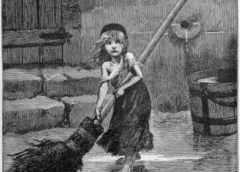The Ladies: A Feminist Criticism
By Marie Elizabeth Sagum
“I dreamed that love would never die-“ a line from Fantine’s solo in the first act of Les Misérables. Indeed, this film is one of the most phenomenal musicals of our age. Just as it exemplifies powerful emotion and sentiment, it also dares to explore issues that other works haven’t even dared to touch. Tom Hooper’s direction, matched with pieces composed by Claude-Michel Schönberg, has truly given justice to Victor Hugo’s masterpiece. Above its display of the insurgency of the people is its portrayal of the harsh reality confronted by women-not only in the 19th century but also today. This cruel truth is manifested in the character of Fantine through her battle against social injustice, sexual harassment, and sexual slavery.
Set in 1832, Les Misérables shows the social conditions and struggles that caused the people’s insurgence. Fantine was introduced into the film as a factory worker through the piece, “At the End of the Day,” which strongly depicts poverty and the awful working conditions faced by the people. Because of the discovery that she has a child, Fantine was fired and dubbed as immoral by her co-workers. To earn a living and to be able to send money to her daughter, she resorted to selling her prized locks, teeth, and ultimately, her body. At some point in the film, Fantine fought back against a man who harassed her. However, upon seeing the situation, Inspector Javert favored the abuser and arrested Fantine. Fortunately, Jean Valjean came and saved her. He took her to a hospital where she eventually met a peaceful death with the assurance that her daughter, Cosette, will be safe in Valjean’s care.
We witness an act of social injustice in Fantine’s very first scene wherein the foreman’s behavior is simply laughed off by some of the workers. Through this part, we can infer that the foreman favors Fantine in a certain manner and forces himself on her in unsettling ways. His proximity and touching already destruct the personal boundaries of Fantine yet he continues to do so, not only because of the power that his position entails but also because of the indifference of the people around them. Fantine becomes even more vulnerable and a subject to ridicule upon the discovery that she has a child despite being unwedded. She gets cast off to the streets and left to fend for her own. In our world today, we witness similar situations depicting the double standards of gender in society. Usually, men are praised and looked up to when they speak of wooing many girls while women are judged and labeled as sluts. Furthermore, women are taught to wear clothes that cover lots of skin to be considered presentable. Truth be told, there is no such thing as “provocative clothing.” It’s the existence of immorality and wickedness in the hearts of some people that lead to harassment and assault. Consequently, Fantine had to join the ladies of the night and become a sex slave to provide for Cosette. In our time, poverty pushes women to this sort of living as well. Without proper education, healthcare, and social assistance programs, disadvantaged women are left with few options and in some cases, only one-sexual slavery. Moreover, Inspector Javert’s attempt to arrest Fantine when she protected herself from a harasser reinforces a victim-blaming rape culture. This awful belief criminalizes women’s behavior and punishes victims instead of chastising the culprits of abuse.
These are the sad realities of our world today. Though their existence is being recognized, they’re still not being stopped. Though many are battling them, there are still some who stand idle. Because of their presence, the reality of love is being questioned. Dreams are being broken. Hopes are getting shattered. Walls are being built in our world, creating divisions among people that prohibit acceptance and comprehension. As a society, we must stand together in eliminating negative perspectives, accepting differences, and promoting equality among everyone no matter what gender, race, age, or religion. We must not let love die. We must make Fantine’s dream real. We are the dream. We are love.
Article Source: http://EzineArticles.com/expert/Marie_Elizabeth_Sagum/2449359
http://EzineArticles.com/?The-Ladies:-A-Feminist-Criticism&id=9766884

Rod Washington: Rod is a blogger, writer, filmmaker, photographer, daydreamer who likes to cook. Rod produces and directs the web series, CUPIC: Diary of an Investigator. He also produces news and documentary video projects. Check out his podcast StoriesThisMoment at https://m3e.d71.myftpupload.com/stm-tncn-podcasts/


